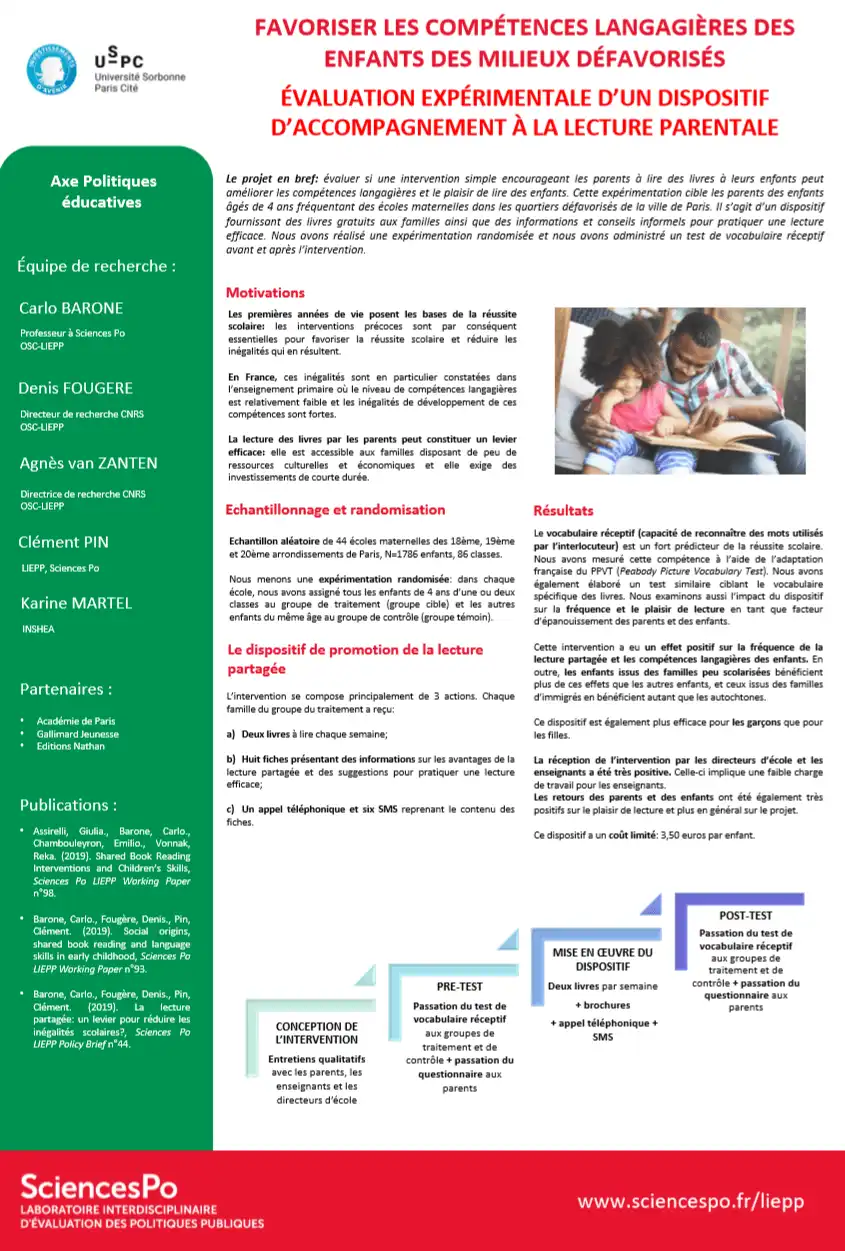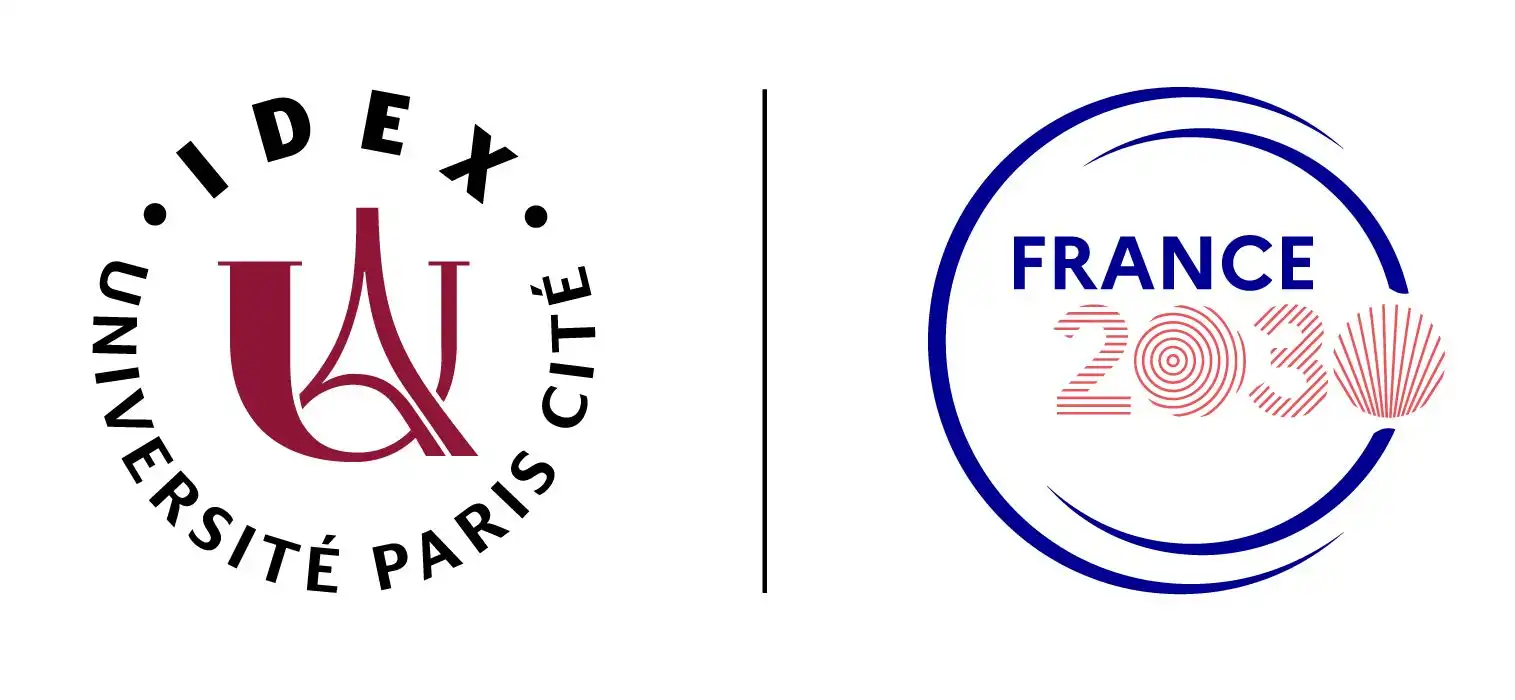
Home>Research>Project>Fostering the Language Skills of Children from Low-educated Families: An Ex-Ante Experimental Evaluation of a Parental Book Reading Intervention
Fostering the Language Skills of Children from Low-educated Families: An Ex-Ante Experimental Evaluation of a Parental Book Reading Intervention
Project Directors:
- Carlo BARONE (Professor at Sciences Po/ OSC-LIEPP, Co-Director of the Educational Policies Research Group)
- Denis FOUGERE (Research Director at CNRS, OSC-LIEPP)
- Agnès van ZANTEN (Research Director at CNRS, OSC-LIEPP)
Associate researchers:
- Géraldine COMORETTO (Research assistant at the LIEPP, Sciences Po)
- Nathalie MAREC BRETON (Lecturer, University of Rennes)
- Karine MARTEL (Lecturer, INSHEA)
- Clément PIN (Research assistant at the LIEPP, Sciences Po)
Partners:
- Académie de Paris (School district of the city of Paris)
- Publishing houses: Gallimard Jeunesse, Turbulences Presse (2016-2017) and Nathan (2017-2018)
This project obtained funding from LIEPP through the 2016 and 2017 calls for proposals.
Material made available at the end of the project:

How to set up the device in your school?
Kit of materials and instructions for the implementation of the parental reading device in nursery schools
Background:
According to the 2011 PIRLS study on student literacy, French children in primary schools display low levels of reading skills. Moreover, socio-economic inequalities in reading skills are particularly strong in France. This project develops an intervention to foster the language skills of socially disadvantaged toddlers by encouraging their parents to read them storybooks. We assess the impact of this intervention using a randomized controlled trial.
The intervention:
The project involves two rounds of experimentation (school years 2016-2017 and 2017-2018). In both years, the intervention involves children aged 4 attending the pre-primary schools of the 18th, 19th and 20th arrondissements (city districts) of the city of Paris. We target the REP/REP, schools which display a high concentration of disadvantaged children.
The intervention comprises four main actions: a) each family receives one book per week; b) the parents receive a short phone-call which presents the intervention and motivates the beneficial effects of book reading for the children; c) parents receive a brochure every week for the first two months of the intervention with tips and suggestions for an effective and enjoyable reading; d) in the 3rd and 4th month some text messages are sent to each family as reminders of the main messages on the phone calls and brochures.
Overall, this is an intensive, but low-cost and easy-to-scale intervention. The first year of the intervention lasted approximately 4 months, while the second year lasted 6 months and focused more on dialogic reading.
Evaluation protocol:
Within each of the 45 schools involved in the project (N=1812), some classes are randomly assigned to the intervention, and the others are assigned to a waiting list for the next school year. We test the frequency of parental book reading and the vocabulary skills of children of the experimental and control group before and after the intervention.
Also, the parental reading project let to a randomized controlled trial in 24 nurseries in Italy.

Publications:
Giulia ASSIRELLI, Carlo BARONE, Emilio CHAMBOULEYRON, Reka VONNAK, Shared Book Reading Interventions and Children's Skills, LIEPP Working Paper n°98, december 2019.
Carlo BARONE, Denis FOUGERE, Clément PIN, Social origins, shared book reading and langague skills in early childhood, LIEPP Working Paper n°93, october 2019.
Carlo BARONE, Denis FOUGERE, Clément PIN, La lecture partagée: un levier pour réduire les inégalités scolaires?, LIEPP Policy Brief n°44, septembre 2019.
Barone, C, Fougère, D and Pin, C. 2019. 'Social origins, shared book reading and language skills in early childhood: evidence from an information experiment'. CEPR Discussion Papers, n°DP14006, London, Centre for Economic Policy Research.
Communications:
Clément PIN. Promouvoir la lecture parentale pour réduire les inégalités scolaires, acte au colloque « La relève scientifique » tenu à l’occasion des 40 ans de la Politique de la ville, 27 février 2018. Page 30.
Dans les médias:
Helping parents to read with their children, VOX CEPR Policy Portal, 13/12/2019
Encourager la lecture familiale pour réduire les inégalités, Cogito, 07/04/2018

